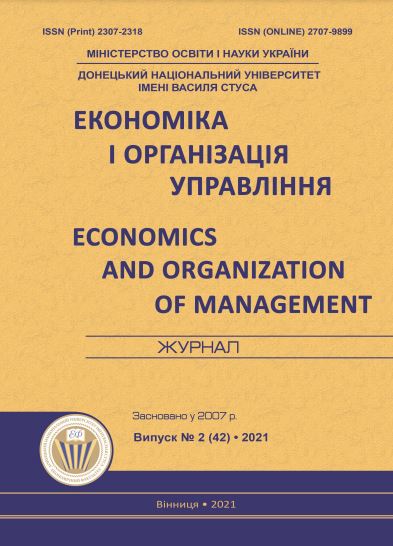Formation of socio-economic mechanism of motivation of human capital development of enterprise in the field of services (tourism)
DOI:
https://doi.org/10.31558/2307-2318.2021.2.11Keywords:
human capital; labor motivation; socio-economic mechanism; service enterprises; efficiencyAbstract
The transformation of the economy and economic relations, which is currently taking place in the light of changes that have affected all countries of the world, requires new approaches to the organization of labor and stimulating and motivating the development of human capital. Since human capital with its components (physical, intellectual, spiritual, socio-cultural), under conditions of their harmonious and proportional development, are the basis for innovative development of the economy as a whole.
The article analyzes the current state of the motivational system of enterprises sphere of services on the example of a tourist enterprise. The main problem areas in the motivation system are identified. In particular, from the results of the survey, it follows that there is disharmony and lack of full interaction between managers and specialists. It was found that the employees of the surveyed company are not sufficiently motivated and dissatisfied with the level of wages and the microclimate in the team. In our opinion, the obtained results should be the basis for improving the motivational mechanism for the tourism enterprise, as the quality of staff in the vast majority depends on the efficiency of the service sector.
It is determined that in forming the socio-economic mechanism of human development motivation capital in the development of tourism in the country in the long run it is necessary to take into account the complexity of the situation with the declared quarantine, creativity, increasing the degree of its intellectualization, education of modern man and based on non-standard approaches to finding effective incentives, attracting highly qualified staff response to market demands.
References
Воєдило А. А. Мотиваційний механізм розвитку людського капіталу в системі Державної прикордонної служби України. Ефективність державного управління. 2012. Вип. 33. С. 165-172.
Грішнова О. А. Мотивація людського розвитку в стратегії економічного зростання України. Вісник ТУП. в 2 ч. Ч. 1. 2003. № 4 (52). С. 50 —54.
Зачоса О.Д. Теоретичні підходи та їх еволюційний розвиток у формуванні людського капіталу. Економіка і організація управління, 2016. № 1(21). С.243-249.
Коденська М.Ю., Нестерчук Ю.О., Соколюк С.Ю., Соколюк К.Ю. Людський капітал в системі соціально-економічних відноси. Умань : Видавець: «Сочінський», 2017. 169 с.
Колот А. М. Мотивація, стимулювання й оцінка персоналу: Навч. посібник. К.: КНЕУ, 1998. 224 с.
Костюнік О.В. Питання управління людським капіталом підприємства. Інвестиції: практика та досвід, 2017. №3. С. 51-54.
Ніколайчук М.В. Тенденції та закономірності управління людським капіталом суб'єктів господарювання. Економіка розвитку, 2012. № 1 (61). С. 63—68.

